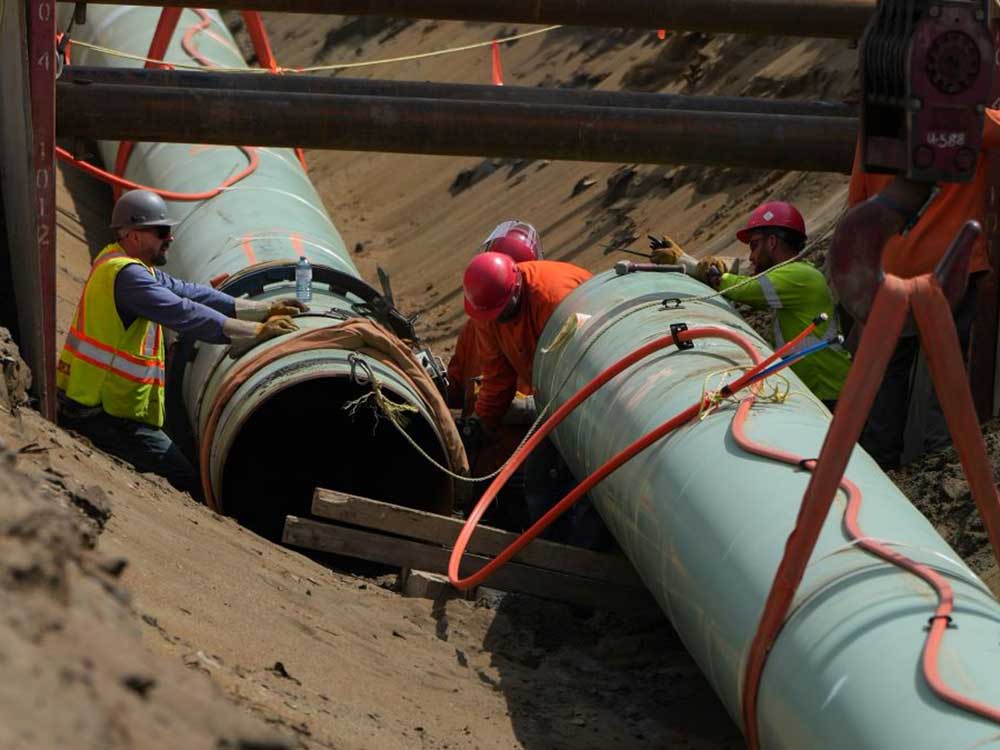Of the 76 words in Trans Mountain Corp.’s most recent statement that its oilsands to tidewater pipeline expansion faces further delays, a quarter of them emit a decidedly “don’t call us, we’ll call you” sentiment.
“Trans Mountain is fully focused on the completion of the pipeline and will not be providing interviews at this time,” the company says.
It’s certainly a creative position. We’re told talking to media is a distraction from the real work; that interviews are nice-to-haves when there’s ample resources, but ultimately this annoying habit we citizens have of asking questions and writing about what’s happening with our money and our infrastructure is simply too time-consuming to respond to when there’s a big, complicated project to finish.
As if construction will somehow grind to a halt while someone in HQ pauses to answer questions from, well, the company’s shareholders: us.
Because, for better or worse, we own this pipeline, ever since the federal government purchased it in 2018 to ensure its completion.
For those who already oppose the TMX expansion, which will triple the amount of oilsands crude piped from Alberta to Burnaby, B.C., the news of further delay underscores the long-term imprudence of a project originally put at $5.9 billion and now an estimated $30.9 billion.
But Trans Mountain’s statement should raise alarm bells for any Canadians concerned with accountability during a time of increasing inequality and many competing needs for public infrastructure spending.
This isn’t a debate about pros and cons of the pipeline. It’s about how one of the largest government-owned projects in Canada is refusing to engage with one of the foundational tools we have to hold them — and other players — accountable.
If a builder had spent five times your original budget for a project, and delayed its completion multiple times, wouldn’t it be reasonable for you to ask for an explanation?
Not in three months when they’re no longer sorting out their own internal problems, not in a year or two, when there’s a major review (at your expense), but when they come to you to say — yet again — there’s another delay.
Wouldn’t you want, at least, a conversation?
TMC’s perfunctory statement offers three possible interpretations: There’s nothing to see here (so don’t bother asking); there’s something to see here (and don’t bother asking); or it doesn’t matter whether there’s something to see here, because you — the media — are not a valid part of the contract we have with the federal government and Canadian citizens.
From a professional public relations and communications perspective, this is patently bad form. And we’re the ones paying TMC’s spinners to engage (or not, as it happens) in such a practice.
(One question that would be pertinent to answer — at Trans Mountain’s convenience, of course — is how much of the $30.9 billion projected cost has been spent on PR and communications since launching the project. Does this refusal to speak with the media suggest a reduction in this particular line item? Is this where the belt-tightening begins?)
Major infrastructure projects consistently overrun in cost and time. Studies show that 98 per cent of mega projects have cost overruns of more than 30 per cent, and spending up to 50 per cent over the original estimate is common. (Why this chronic under budgeting continues is the subject of thousands of white papers and many more raised eyebrows.)
Here at home, the Site C dam cost originally was pegged at $6.6 billion. That grew from $7.9 billion to $8.3 billion to $9 billion to $10 billion to $12 billion to, now, $16 billion and counting.
BC Hydro estimated it had awarded Site C contracts without competition amounting to $430 million. Then, in August, when questioned by The Narwhal, the Crown corporation apologized for missing $128 million in its estimate. The real number, it admits, is $558 million. One of those non-competing recipients happened to be SNC-Lavalin, which confessed in 2019 to paying $127 million in bribes to Libyan officials for their own projects.
All of which is to say that megaprojects and the people profiting from them must be held accountable.
When the company building a publicly owned, out-of-control, $30.9-billion megaproject says it can’t be bothered to explain where the money is flowing, there is a cost to democracy. It fits a strategy of seeking to undermine, rather than affirm, news media’s role in demanding transparency. Easier to pretend such inquiries are partisan theatre not worth taking seriously.
That adversarial playbook seems to be working, unfortunately, to erode faith in the “fourth pillar” of democracy. Canadians’ trust in media fell from 55 to 40 per cent in 2023 in just seven years. South of the 49th, politicians are the most likely source of media criticism the public hears, taking their cue from Donald Trump’s assertion that media “has gotten so bad and hateful that it is beyond description.”
Trans Mountain’s contribution to the denigration of the public’s right to know, and therefore the media’s right to demand answers, is to simply refuse to even play. Regardless of the demonizations or valid critiques often hurled at the press, they remain one of the few tools we have to demand accountability within democracy.
That, and writing to our MP, perhaps never hearing back, and waiting — chance upon chance — that a question is asked in the House.
If reporters aren’t considered worthy of a response, perhaps MPs are. How many MPs have so far publicly demanded an explanation of Trans Mountain’s recent announcement? How many Liberal ones, if they truly have their constituents’ best interests at heart?
The pipeline’s efficacy in the face of increasingly disrupted economics, looming (and missing) net-zero targets and continued opposition from multiple Indigenous Nations is hotly contested. But the erosion of accountability is something we should all be concerned about.
Don’t call us, we’ll call you? Time for us to call that out. ![]()
Read more: Energy, Federal Politics

















Tyee Commenting Guidelines
Comments that violate guidelines risk being deleted, and violations may result in a temporary or permanent user ban. Maintain the spirit of good conversation to stay in the discussion and be patient with moderators. Comments are reviewed regularly but not in real time.
Do:
Do not: